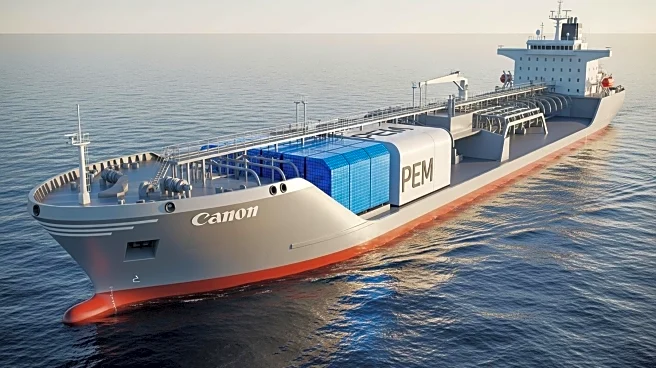What is the story about?
What's Happening?
Bureau Veritas Marine & Offshore (BV) has granted Approval in Principle (AiP) for the design of the world's first ammonia-fueled LR2 tanker powered by Proton Exchange Membrane Fuel Cell (PEMFC) technology. This approval confirms the technical feasibility and initial conformity to industry standards for the vessel, which is part of a strategic joint development project involving MISC Berhad (MISC), Samsung Heavy Industries (SHI), and BV. The project aims to design and develop a large-scale commercial vessel integrating PEMFC technology developed by Vinssen and an Ammonia Cracking System (ACS) engineered by Panasia. The vessel is designed to meet stringent International Maritime Organization (IMO) regulations while providing significant operational benefits. MISC leads vessel operations and market adoption strategies, while SHI oversees vessel design and engineering development. BV ensures regulatory compliance and conducts risk assessments.
Why It's Important?
The approval of this ammonia-powered tanker design marks a significant advancement in maritime technology, potentially reducing the industry's carbon footprint. By integrating PEMFC technology, the vessel can achieve full-scale power for propulsion and onboard energy needs, surpassing previous applications limited to smaller vessels. This development aligns with global efforts to meet IMO regulations aimed at reducing greenhouse gas emissions from shipping. The project could set a precedent for future innovations in sustainable maritime transport, benefiting shipbuilders, operators, and environmental stakeholders. The successful implementation of this technology may encourage further investment in green shipping solutions, contributing to the industry's transition towards cleaner energy sources.
What's Next?
Following the Approval in Principle, the next steps involve further development and testing to ensure the vessel's design meets all operational and safety standards. MISC and SHI will continue to refine the vessel's design and integration of PEMFC technology, while BV will conduct ongoing assessments to ensure compliance with industry regulations. The project partners may seek additional collaborations or funding to support the commercialization of this technology. As the maritime industry increasingly focuses on sustainability, other companies may explore similar innovations, potentially leading to broader adoption of ammonia-powered vessels.
Beyond the Headlines
The development of ammonia-powered vessels raises important ethical and environmental considerations. While ammonia is a promising alternative fuel due to its zero-carbon emissions, its production and handling require careful management to prevent environmental harm. The successful deployment of this technology could influence regulatory frameworks and industry standards, prompting discussions on the balance between innovation and environmental protection. Additionally, the project highlights the role of international collaboration in advancing sustainable technologies, potentially fostering stronger partnerships across the maritime sector.















